Scott Archer Boorman (born February 1, 1949) is a mathematical sociologist at Yale University.
Scott Archer Boorman (born February 1, 1949) is a mathematical sociologist at Yale University.
His father, Howard L. Boorman, was a Foreign Service Officer in Beijing, China, and he was born there as Chinese Communists troops entered the city. He received no formal education before enrolling at Harvard College, and had largely completed work on his book, The Protracted Game, which was published in 1971. [1]
He earned his B.A. in Applied Mathematics, and was a Harvard Junior Fellow. He received his Ph.D. in Sociology from Harvard University and was appointed to a full professorship at Penn before moving to Yale. He is also a graduate of Yale Law School.
While still a teenager, Boorman wrote The Protracted Game : A Wei-Ch'i Interpretation of Maoist Revolutionary Strategy (1969), an analysis of the U.S. involvement in Vietnam. He shows that the U.S. thought it was playing Chess, while in fact the game was Wei-Ch'i (also known as Go).
He systematically explores the similarity between the military strategies of Chinese Communist insurgency and the Chinese board game wei-ch’i, in contrast to parallel U.S. analyses of the same events. Boorman also argues that wei-chi's analysis of a strategic system presents a more sophisticated and flexible form of game theory than the traditional western models of strategic choice. [2]
His book, Genetics of Altruism (1980) uses mathematical population genetics to analyze the development of sociality and altruism through three modes of selection: group, kin and reciprocity.
Game theory is the study of mathematical models of strategic interactions among rational agents. It has applications in all fields of social science, as well as in logic, systems science and computer science. The concepts of game theory are used extensively in economics as well. The traditional methods of game theory addressed two-person zero-sum games, in which each participant's gains or losses are exactly balanced by the losses and gains of other participants. In the 21st century, the advanced game theories apply to a wider range of behavioral relations; it is now an umbrella term for the science of logical decision making in humans, animals, as well as computers.

Maoism, officially called Mao Zedong Thought by the Chinese Communist Party (CCP), is a variety of Marxism–Leninism that Mao Zedong developed to realize a socialist revolution in the agricultural, pre-industrial society of the Republic of China and later the People's Republic of China. The philosophical difference between Maoism and traditional Marxism–Leninism is that a united front of progressive forces in class society would lead the revolutionary vanguard in pre-industrial societies rather than communist revolutionaries alone. This updating and adaptation of Marxism–Leninism to Chinese conditions in which revolutionary praxis is primary and ideological orthodoxy is secondary represents urban Marxism–Leninism adapted to pre-industrial China. Later theoreticians expanded on the idea that Mao had adapted Marxism–Leninism to Chinese conditions, arguing that he had in fact updated it fundamentally and that Maoism could be applied universally throughout the world. This ideology is often referred to as Marxism–Leninism–Maoism to distinguish it from the original ideas of Mao.
People's war, also called protracted people's war, is a Maoist military strategy. First developed by the Chinese communist revolutionary leader Mao Zedong (1893–1976), the basic concept behind people's war is to maintain the support of the population and draw the enemy deep into the countryside where the population will bleed them dry through a mix of mobile warfare and guerrilla warfare. It was used by the Chinese communists against the Imperial Japanese Army in World War II, and by the Chinese Soviet Republic in the Chinese Civil War.

Soong Tse-vung, more commonly romanized as Soong Tse-ven or Soong Tzu-wen, was a prominent businessman and politician who was the Premier of China and a banker.

George Robert Price was an American population geneticist. Price is often noted for his formulation of the Price equation in 1967.
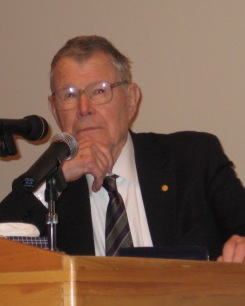
Thomas Crombie Schelling was an American economist and professor of foreign policy, national security, nuclear strategy, and arms control at the School of Public Policy at University of Maryland, College Park. He was also co-faculty at the New England Complex Systems Institute. He was awarded the 2005 Nobel Memorial Prize in Economic Sciences for "having enhanced our understanding of conflict and cooperation through game-theory analysis."
Evolutionary game theory (EGT) is the application of game theory to evolving populations in biology. It defines a framework of contests, strategies, and analytics into which Darwinian competition can be modelled. It originated in 1973 with John Maynard Smith and George R. Price's formalisation of contests, analysed as strategies, and the mathematical criteria that can be used to predict the results of competing strategies.
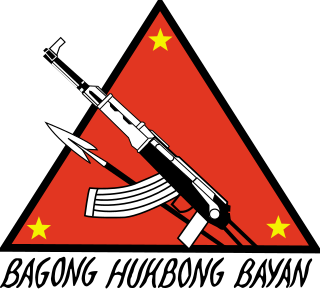
The New People's Army, abbreviated NPA or BHB, is the armed wing of the Communist Party of the Philippines (CPP). It acts as the CPP's principal organization, aiming to consolidate political power from what it sees as the present "bourgeois reactionary puppet government" and to aid in the "people's democratic revolution". Founded on March 29, 1969, by the collaboration of Jose Maria Sison and former members of the Hukbalahap led by Bernabe Buscayno, the NPA has since waged a guerrilla war based on the Maoist strategy of protracted people's war. The NPA is one of the key figures in the ongoing Communist rebellion in the Philippines, the longest ongoing conflict in the country.

The Communist Party of the Philippines is a far-left, Marxist–Leninist–Maoist revolutionary organization and communist party in the Philippines, formed by Jose Maria Sison on 26 December 1968. It is designated as a terrorist group by the United States Department of State together with Sison and its armed wing New People's Army (NPA) in 2002. The European Union renewed its terrorist designation on the organization in 2019, though a 2009 ruling by the EU's second highest court delisted Sison as a "person supporting terrorism" and reversed a decision by member governments to freeze assets. According to the US' Central Intelligence Agency (CIA) World Factbook, the CPP and the NPA aims to destabilize the Philippines' economy and overthrow the national government.
Robert Ludlow "Bob" Trivers is an American evolutionary biologist and sociobiologist. Trivers proposed the theories of reciprocal altruism (1971), parental investment (1972), facultative sex ratio determination (1973), and parent–offspring conflict (1974). He has also contributed by explaining self-deception as an adaptive evolutionary strategy and discussing intragenomic conflict.
On Protracted War is a work comprising a series of speeches by Mao Zedong given from May 26, 1938, to June 3, 1938, at the Yenan Association for the Study of the War of Resistance Against Japan. In it, he calls for a protracted people's war, as a means for small revolutionary groups to fight the power of the state.

The Naxalite–Maoist insurgency is an ongoing conflict between Maoist groups known as Naxalites or Naxals and the Indian government. The influence zone of the Naxalites is called the red corridor, which has been steadily declining in terms of geographical coverage and number of violent incidents, and in 2021 it was confined to the 25 "most affected" locations and 70 "total affected" districts across 10 states in two coal-rich, remote, forested hilly clusters in and around the Dandakaranya-Chhattisgarh-Odisha region and the tri-junction area of Jharkhand-Bihar and-West Bengal. The Naxalites have frequently targeted tribal, police and government workers in what they say is a fight for improved land rights and more jobs for neglected agricultural labourers and the poor.
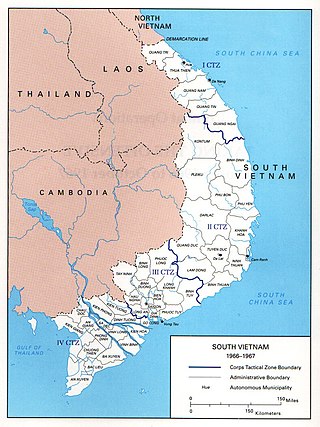
During the Cold War in the 1960s, the United States and South Vietnam began a period of gradual escalation and direct intervention referred to as the "Americanization" of joint warfare in South Vietnam during the Vietnam War. At the start of the decade, United States aid to South Vietnam consisted largely of supplies with approximately 900 military observers and trainers. After the assassination of both Ngo Dinh Diem and John F. Kennedy close to the end of 1963 and Gulf of Tonkin incident in 1964 and amid continuing political instability in the South, the Lyndon Johnson Administration made a policy commitment to safeguard the South Vietnamese regime directly. The American military forces and other anti-communist SEATO countries increased their support, sending large scale combat forces into South Vietnam; at its height in 1969, slightly more than 400,000 American troops were deployed. The People's Army of Vietnam and the allied Viet Cong fought back, keeping to countryside strongholds while the anti-communist allied forces tended to control the cities. The most notable conflict of this era was the 1968 Tet Offensive, a widespread campaign by the communist forces to attack across all of South Vietnam; while the offensive was largely repelled, it was a strategic success in seeding doubt as to the long-term viability of the South Vietnamese state. This phase of the war lasted until the election of Richard Nixon and the change of U.S. policy to Vietnamization, or ending the direct involvement and phased withdrawal of U.S. combat troops and giving the main combat role back to the South Vietnamese military.
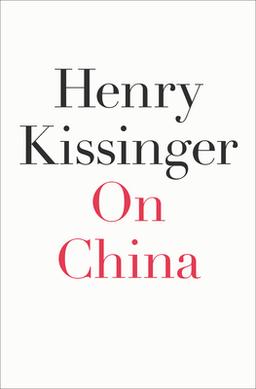
On China is a 2011 non-fiction book by Henry Kissinger, former National Security Adviser and United States Secretary of State. The book is part an effort to make sense of China's strategy in diplomacy and foreign policy over 3000 years and part an attempt to provide an authentic insight on Chinese Communist Party leaders. Kissinger, considered one of the most famous diplomats of the 20th century, played an integral role in developing the relationship between the United States and the People's Republic of China during the Nixon administration, which culminated in Nixon's 1972 visit to China.

Guevarism is a theory of communist revolution and a military strategy of guerrilla warfare associated with Marxist–Leninist revolutionary Ernesto "Che" Guevara, a leading figure of the Cuban Revolution who believed in the idea of Marxism–Leninism and embraced its principles.

Ji Chaoding was a Chinese economist and political activist. His book Key Economic Areas in Chinese History (1936) influenced the conceptualization of Chinese history in the West by emphasizing geographic and economic factors as the basis of dynastic power.
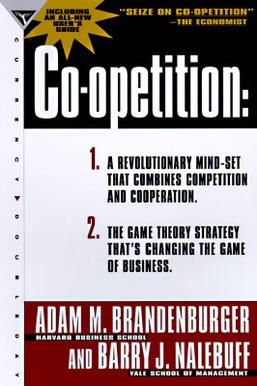
Co-opetition: A Revolution Mindset that Combines Competition and Cooperation is a non-fiction book on coopetition, business strategy, and game theory by Adam M. Brandenburger and Barry J. Nalebuff. The book was initially published by Crown Business on May 1, 1996. As of 2015, the book is still available in its 9th printing.
Reciprocal altruism in humans refers to an individual behavior that gives benefit conditionally upon receiving a returned benefit, which draws on the economic concept – ″gains in trade″. Human reciprocal altruism would include the following behaviors : helping patients, the wounded, and the others when they are in crisis; sharing food, implement, knowledge.
The Berge equilibrium is a game theory solution concept named after the mathematician Claude Berge. It is similar to the standard Nash equilibrium, except that it aims to capture a type of altruism rather than purely non-cooperative play. Whereas a Nash equilibrium is a situation in which each player of a strategic game ensures that they personally will receive the highest payoff given other players' strategies, in a Berge equilibrium every player ensures that all other players will receive the highest payoff possible. Although Berge introduced the intuition for this equilibrium notion in 1957, it was only formally defined by Vladislav Iosifovich Zhukovskii in 1985, and it was not in widespread use until half a century after Berge originally developed it.
Howard Lyon Boorman was a United States Foreign Service Officer who after retirement became best known for organizing and editing the Biographical Dictionary of Republican China a standard reference work commonly referred to simply as "Boorman."